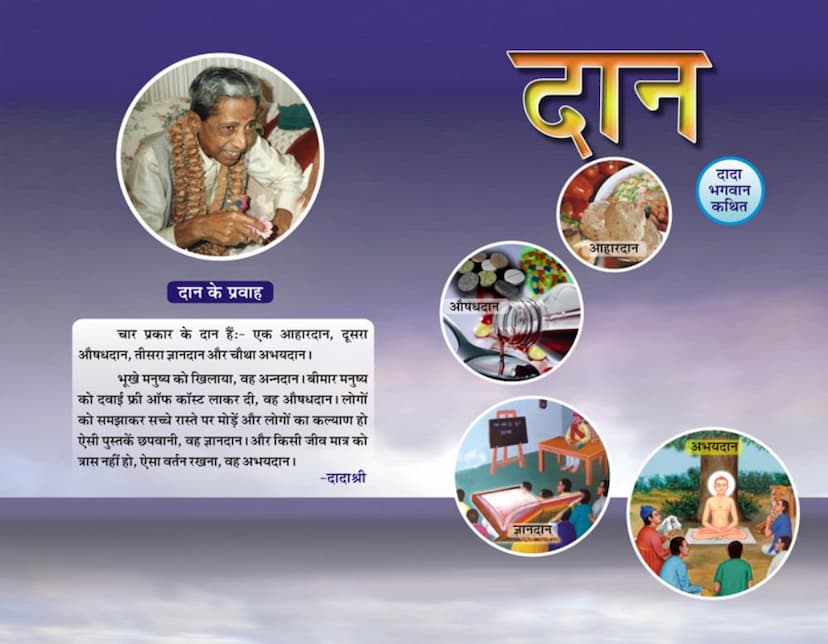Daan
Added to library: September 1, 2025

Summary
The book "Daan" by Dada Bhagwan, published by Mahavideh Foundation, is a discourse on the concept of 'Daan' (charity or giving) from a Jain perspective, as expounded by Dada Bhagwan. The text, which is a translation from Gujarati, emphasizes the spiritual significance of giving and offers guidance on how to practice it correctly.
Key Concepts and Themes:
-
Four Types of Daan: The book categorizes Daan into four main types:
- Aahardan (Food Donation): Providing food to the hungry.
- Aushaddhan (Medicine Donation): Giving medicine to the sick.
- Gyandan (Knowledge Donation): Spreading spiritual knowledge through books and teachings for the welfare of others.
- Abhaydan (Fearlessness Donation): Living in a way that causes no harm or fear to any living being. Dada Bhagwan considers this the highest form of donation.
-
The True Purpose of Giving: Dada Bhagwan explains that giving should not be motivated by the desire for personal gain or worldly recognition. True giving stems from a selfless intention to alleviate the suffering of others and bring about their welfare. Giving for the sake of name or fame is considered a "kirti-daan" (donation for fame) and is less effective.
-
The Importance of Intention (Bhavna): The sincerity and purity of the intention behind giving are paramount. Even a small donation given with the right intention and an awareness of the spiritual principles behind it is more valuable than a large donation given with ego or for worldly recognition.
-
The Nature of Wealth (Lakshmi): Wealth is described as transient and fickle. Its true value lies in its proper utilization. When wealth is used for charitable purposes, particularly for spiritual knowledge and the welfare of living beings, it leads to merit and positive spiritual progress. Otherwise, wealth can be easily squandered or lead to downfall.
-
Giving Wisely: The book stresses the importance of giving intelligently. It is not always advisable to give cash directly, especially to those who might misuse it. Providing food, medicine, or support for spiritual pursuits is often more effective. The giver should ensure that their donation is used for a righteous purpose.
-
The Spiritual Impact of Giving:
- Aahardan and Aushaddhan: These are considered valuable, especially Aushaddhan, as they sustain life and alleviate suffering for a longer duration.
- Gyandan: This is highly praised as it leads to higher realms of existence and can even lead to liberation (moksha).
- Abhaydan: This is the most profound form of giving, involving living without causing fear or harm to any creature. It is considered the highest form of spiritual practice and is difficult to achieve perfectly.
-
Avoiding the "Sin of Keeping": The text advises against hoarding wealth or accumulating it without proper use. Wealth that is not used for good purposes or for the welfare of others is considered to be "going into the gutter."
-
The Role of the Giver: The giver should be aware of their own intentions and avoid the pitfalls of ego, pride, and the desire for recognition. True giving is done with a pure heart and a desire for the welfare of all. The concept of "usage" (upyog) and "awareness" (jagriti) is crucial in all actions, including giving.
-
The "Akrraam Marg" (Non-linear Path): The teachings are attributed to Dada Bhagwan, who offered a direct path to self-realization. The book implies that understanding these principles of giving is part of this path to spiritual liberation.
-
Distinguishing True Giving from Worldly Practices: The book differentiates between true spiritual giving and worldly practices like giving for fame, social obligation, or to avoid taxes. The emphasis is on giving that leads to inner purification and spiritual growth.
-
The Example of the Marwaris: The text notes that certain communities, like the Marwaris, have a tradition of setting aside a portion of their earnings for God and charitable purposes, viewing it as sowing seeds for future prosperity.
-
The Impact of Wealth: The book discusses how wealth acquired through unethical means ("two number" money) can lead to negative consequences. While giving such money for charity might mitigate some of the sin, it is ultimately better to earn money righteously.
-
Giving to "Mahatmas": A special emphasis is placed on serving and supporting "Mahatmas" (enlightened beings or those on the spiritual path) as a highly meritorious act. Their presence is considered a source of spiritual upliftment, and serving them is described as the highest form of sacrifice or "yagna."
In essence, "Daan" by Dada Bhagwan is a guide to understanding and practicing charity from a spiritual perspective. It encourages selfless giving, pure intentions, and the wise utilization of resources for the ultimate welfare of oneself and all living beings, leading towards spiritual progress and liberation.